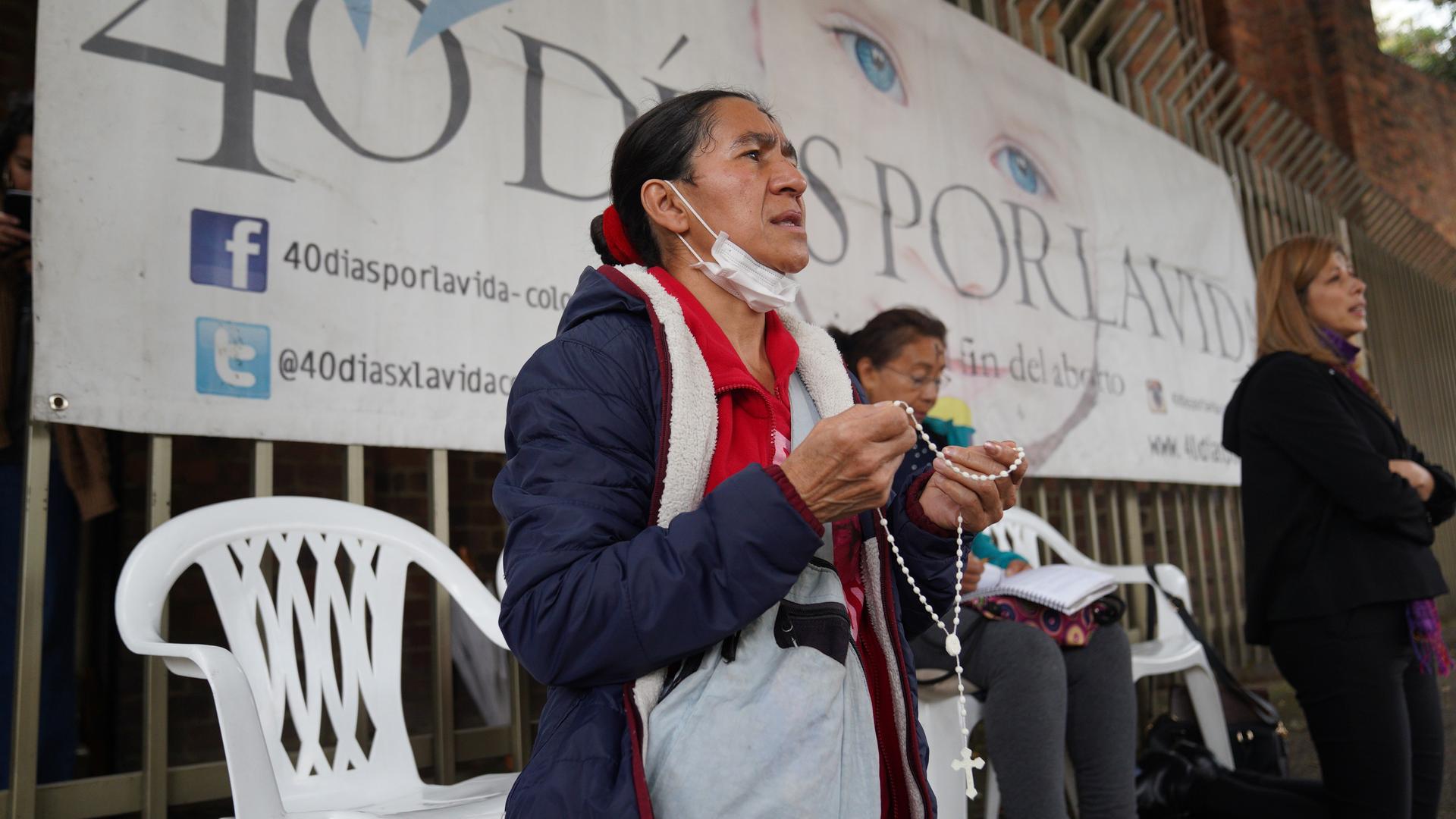US conservative groups ramp up influence in Colombia amid abortion debate
Volunteers from the conservative group 40 Days for Life pray outside an abortion clinic in Bogotá, Colombia, on Feb. 26, 2020.
Yerlin Pineda stood outside an abortion clinic in Colombia’s capital city for four hours, praying the rosary and reading biblical texts with a small group of men and women.
She’s a volunteer for 40 days for Life, an international movement that started in Texas in 2007, and now conducts vigils outside abortion clinics in more than 60 countries.
The movement claims that its protests have helped to shut down 106 abortion clinics around the world. And it has been ramping up activities in Colombia — where, on Monday, March 2, the constitutional court reviewed the option of giving women full access to the procedure until the fourth month of pregnancy — but ultimately decided to table the vote.
Related: The women of Argentina’s abortion debate
“I am here to tell women that they have other options. … I don’t want more women to go through that physical and mental torture.”
“I am here to tell women that they have other options,” said Pineda, 51, who had an abortion when she was 19. “I don’t want more women to go through that physical and mental torture.”
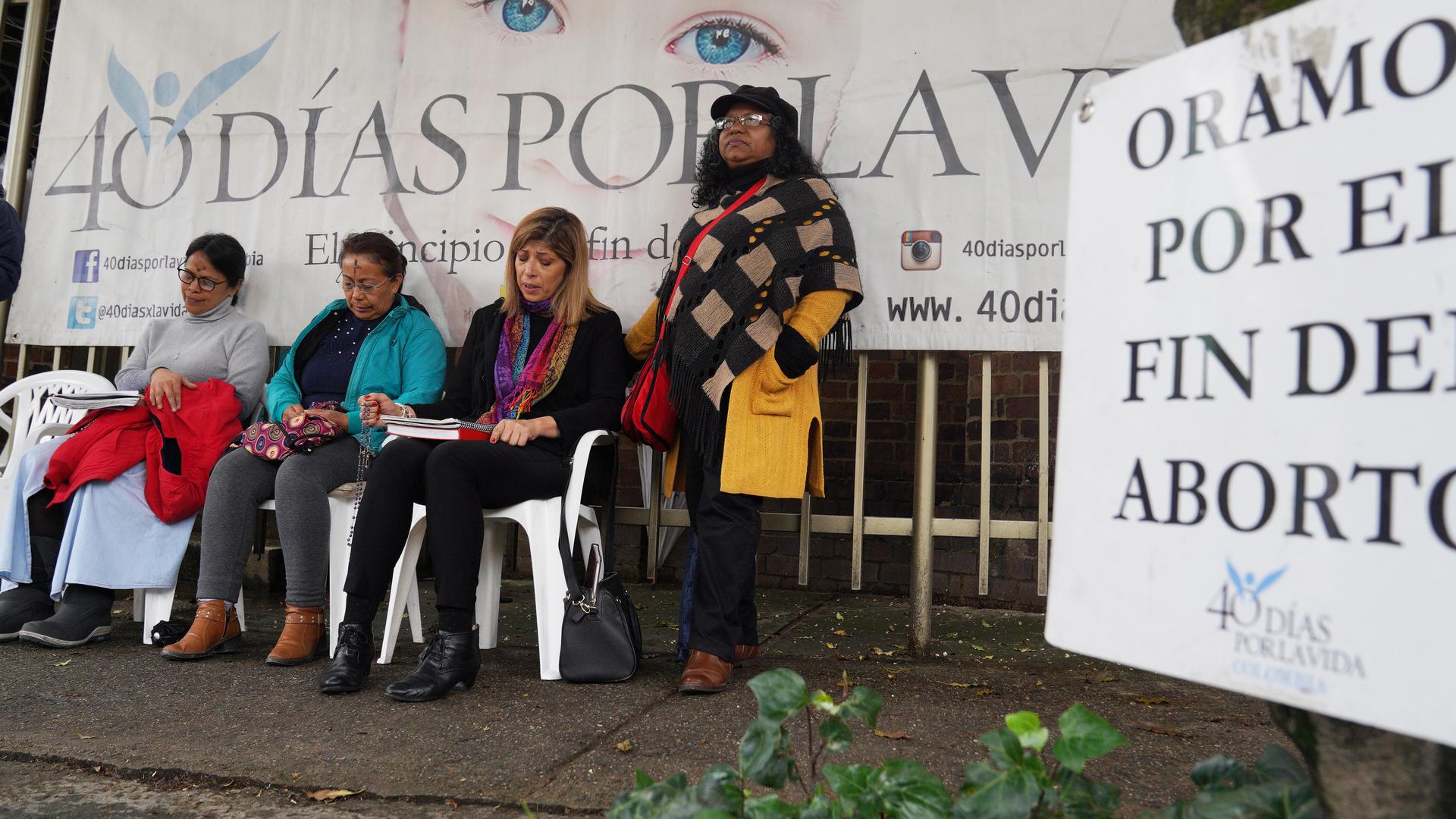
Among a handful of US conservative groups campaigning against abortion rights through lobbying and litigation in Latin America, 40 Days for Life uses a variety of strategies including street protests and vigils.
Other groups include Human Life International, an organization based in Miami, Florida, that has helped to train an influential anti-abortion group in El Salvador, as well as Potential Church, which raised funds for a Peruvian pastor who was elected to his country’s congress in 2011 and has led the charge against abortion there.
The influence of these anti-abortion groups was recently put to the test in Colombia when a judge from the constitutional court proposed last month that women should be able to access abortion on request until the 16th week of pregnancy. Currently, women in Colombia can get abortions, but only if they prove that they were rape victims or that carrying out the pregnancy is detrimental to their physical or mental health.
Related: ‘Maternity jail’: Women in Argentina and the US find ways around restrictive abortion laws
The proposal by Judge Alejandro Linares would have made it easier for women to get abortions. It followed a complaint filed in the court last year by Natalia Bernal, a conservative lawyer, who had argued that abortion should be completely banned because it was “violating the rights” of unborn children and exposing women who get abortions to psychological and physical trauma.
A majority of judges on the court ultimately refused on Monday to vote on either proposal, saying that the initial complaint filed by Bernal had been inadequately formulated and that it was not the court’s job to decide if abortion had positive or negative impacts. However, they reaffirmed that abortion would continue to be allowed in Colombia — under special circumstances.
Women’s rights groups reacted to the court’s non-vote as a victory, of sorts.
“We believe the court lost the opportunity to make historical progress. … But, on the other hand, it is also a decision that reaffirms that in Colombia, there is no turning back on the right to terminate pregnancies.”
“We believe the court lost the opportunity to make historical progress,” said Mariana Ardila, a lawyer for Women’s Link, a group that has been at the forefront of the abortion debate in Colombia. “But, on the other hand, it is also a decision that reaffirms that in Colombia, there is no turning back on the right to terminate pregnancies.”
For anti-abortion groups in Colombia, it was also a bittersweet decision.
Pamela Delgado, the Colombia director for the 40 Days for Life movement, said that instead of granting more access to abortion, the country needs policies to support pregnant women “who are in crisis” so that they can have their babies.
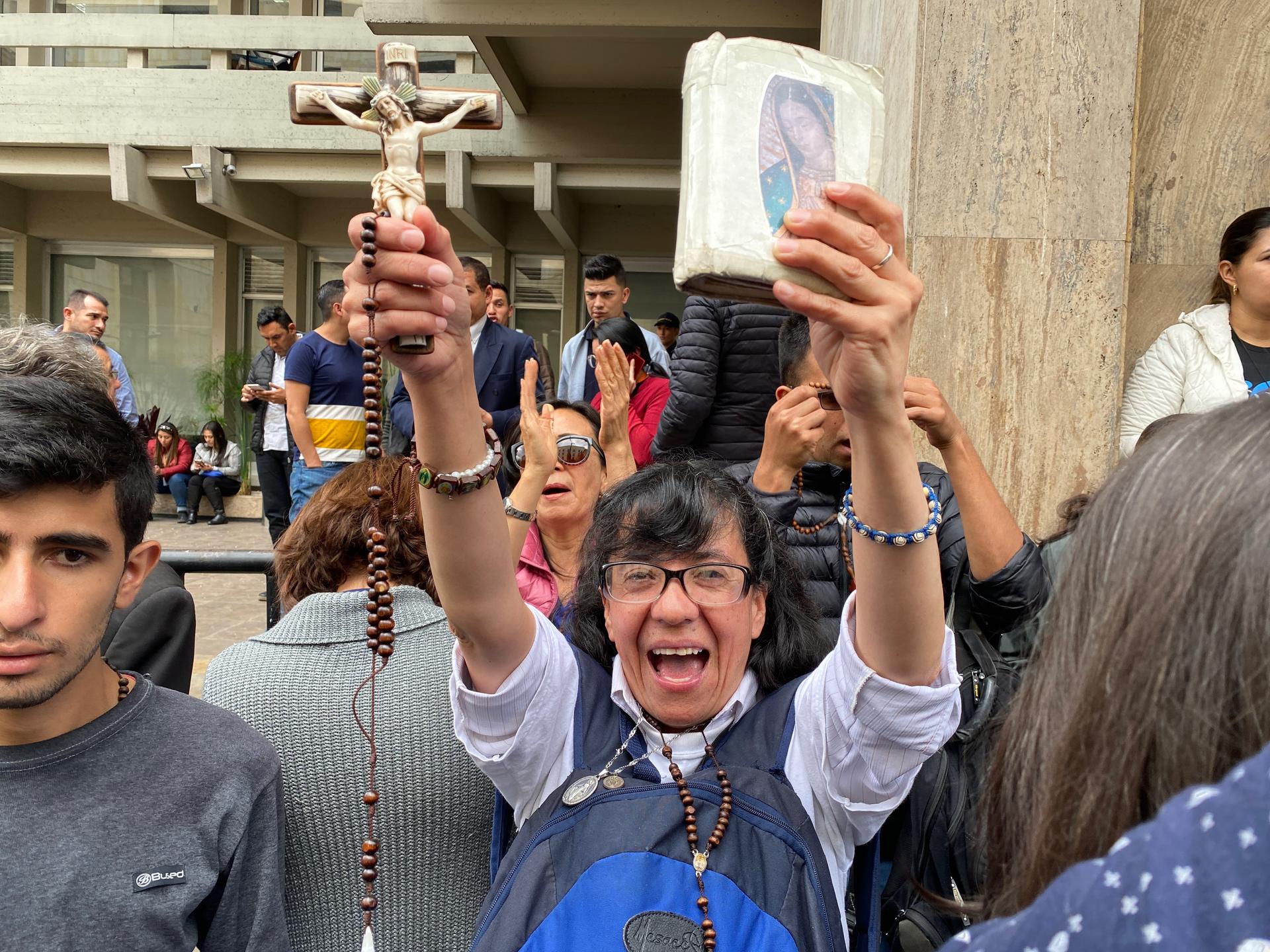
Delgado set up a support center for pregnant women just two blocks away from an abortion clinic in Bogotá, which is modeled after Crisis Pregnancy Centers in the United States.
At the Bogotá center, women can get pregnancy tests, as well as guidance on options other than abortion, like adoption. Some of the women who visit the center have been directed there by campaigners who hold vigils outside abortion clinics.
“We embrace [pregnant] women who are in crisis and offer them support. … We listen to their cases and help them to think through the situation they are going through.”
“We embrace [pregnant] women who are in crisis and offer them support,” Delgado told The World. “We listen to their cases and help them to think through the situation they are going through.”
Related: Salvadoran women serve long prison sentences for miscarriage
The center also trains pregnant women in skills like sewing and shoe repair, so that they can find ways to support their children after carrying the pregnancy to full term.
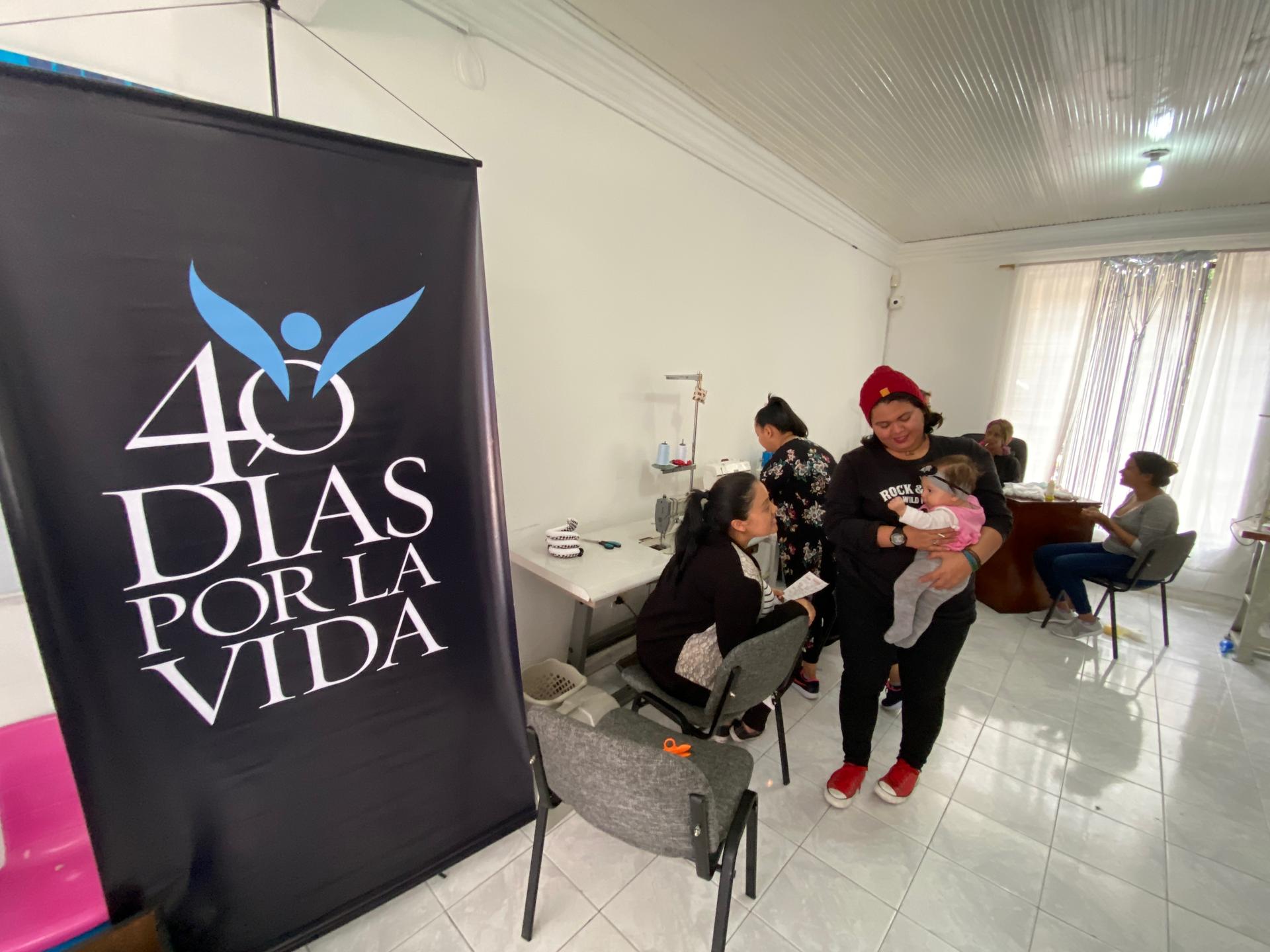
Delgado said that her organization has managed to “save at least 400 lives” since it was set up in Colombia, five years ago. The group has also expanded its presence outside abortion clinics, going from holding a single vigil in 2015 to vigils in 40 cities this month.
“Sometimes we feel frustrated with court decisions that do not represent us,” Delgado said during a recent protest outside Colombia’s constitutional court. “But we will continue to ask governments to come up with policies that safeguard the lives of vulnerable children who are in women’s wombs.”
‘A strong example for the region’
If a majority of the court’s nine judges had approved the proposal, Colombia would have become the largest country in Latin America to allow full access to abortion.
“Judges in nearby countries read what is happening in the Colombian constitutional court, so it could influence other legal battles that are brewing elsewhere.”
Before the ruling on Monday, Camila Gianella, a researcher at the Chr. Michelsen Institute who focuses on the politics of reproductive rights in Latin America said “it could be a strong example for the region. … Judges in nearby countries read what is happening in the Colombian Constitutional Court, so it could influence other legal battles that are brewing elsewhere.”
Cuba, Guyana and Uruguay are currently the only countries in Latin America and the Caribbean that allow abortion upon request. Six countries in the region, including El Salvador and Haiti, forbid abortion under any circumstances and have imprisoned women for terminating their pregnancies.
Most countries in the region — including Colombia — have laws that permit abortion under special circumstances: A woman can get an abortion if she can prove that she was raped, or if she can prove with medical records that the pregnancy is a threat to her health.
Related: Argentina is divided over abortion — even the feminists
But several countries are leaning toward expanding access, including Argentina, where President Alberto Fernández presented a bill to his nation’s congress this week to decriminalize abortion.
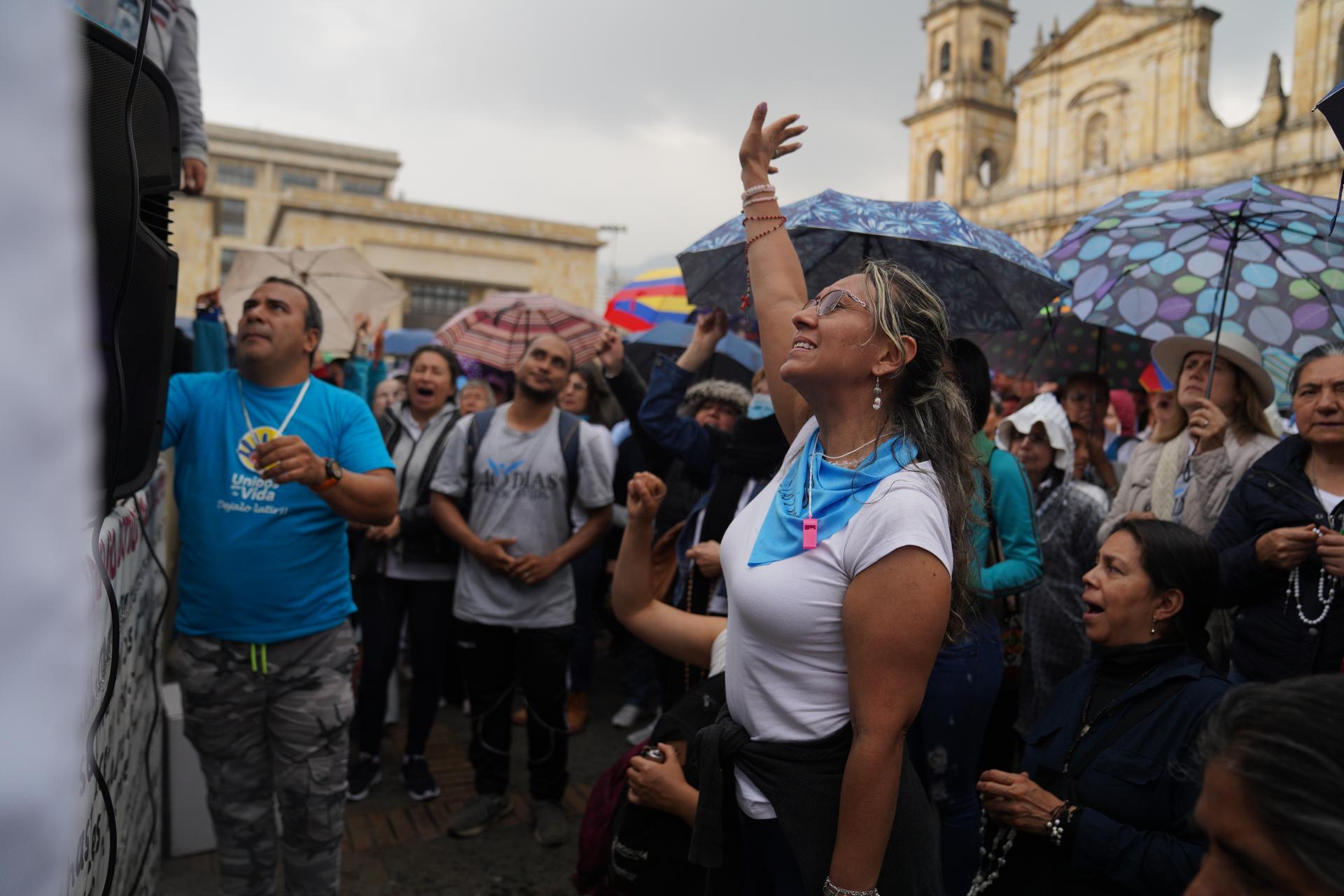
“At a global level, the tendency has been for countries to decriminalize. … That’s because they have realized that criminalizing abortion does not lead to [fewer] procedures. Instead, it pushes women to end their pregnancies in unsafe places and puts their health at risk.”
“At a global level, the tendency has been for countries to decriminalize,” said Cristina Rosero, a legal analyst at the Center for Reproductive Rights based in New York. “That’s because they have realized that criminalizing abortion does not lead to [fewer] procedures. Instead, it pushes women to end their pregnancies in unsafe places and puts their health at risk.”
A study conducted by the Center for Reproductive Rights shows that over the past 25 years, 48 countries have changed their laws to expand access to abortion. At the moment, 67 nations around the world allow abortion on request, with Ireland becoming the latest country on that list.
But anti-abortion groups are not giving up their fight.
Gianella said in Latin America, anti-abortion groups from the US and Latin America have managed to lobby a majority of congress members in Guatemala, Honduras and El Salvador to sign pacts in which they promise to keep abortion criminalized.
In Peru, where abortion is allowed only when the mother’s life is at risk, Catholic anti-abortion groups have filed injunctions against a procedural manual written by the Ministry of Health that specifies when doctors are allowed to perform abortions, arguing that the manual “violates the rights of recently conceived” humans. In Argentina, anti-abortion groups lobbied the senate to include a clause in the country’s civil code that says human existence begins “at the moment of conception.”
But that view was widely rejected outside an abortion clinic in Bogotá, where women wearing green scarves symbolic of the reproductive rights movement in Latin America protested in favor of the recent court proposal for expanded access.
“We must give women the right to decide when they want to be mothers or not. … We are not second class citizens. We must be able to make decisions about our own future.”
“We must give women the right to decide when they want to be mothers or not,” said Alejandra Ramirez, a member of Colombia’s Campaign for Safe, Legal and Free Abortion. “We are not second class citizens. We must be able to make decisions about our own future.”
The story you just read is accessible and free to all because thousands of listeners and readers contribute to our nonprofit newsroom. We go deep to bring you the human-centered international reporting that you know you can trust. To do this work and to do it well, we rely on the support of our listeners. If you appreciated our coverage this year, if there was a story that made you pause or a song that moved you, would you consider making a gift to sustain our work through 2024 and beyond?
